Wonder Woman 1984 is out at theaters and streaming freely on HBO Max! In 2017, Wonder Woman broke out to the adoring approval of women and men around the world, giving us all a top tier superheroine. This time around, Diana Prince had higher expectations but fell a bit short of the mark. The film isn’t terrible, but I just found myself irritated by the sloppy writing and incoherent plotlines, only to slip back into a stretch of satisfying viewing. Bizarrely, Wonder Woman is half Bruce Almighty and half Superman 4: The Quest for Peace.
Some critics completely trash the movie, while others heap gushing praise at the stunning and brave topics. Honestly, though, the film really doesn’t fall into either extreme category. In the end, I believe the Wonder Woman brand is left intact, but the clashing styles, bad plotlines, and mixed messaging will doom Wonder Woman 1984 to fade fast once the hype runs out.

The Good, the Bad, and the Ugly
Warning! Spoilers ahead.
We should give Wonder Woman 1984 some fair credit. The opening sequence is excellent. We get a great and fully realized depiction of Themyscira. The female-dominated society looked pretty awesome and I enjoyed the over-the-top obstacle course. Although I found it odd that a little girl would compete against seasoned female warriors in a goddess-level Olympics. I also liked that Diana cheats to try and win, only to be disqualified. Despite the dishonest effort to win, I was surprised that Diana avoids any serious scolding. I don’t know about you, but cheating in something like the Olympics carries a major stigma and is grounds for immediate public shame. The film largely glosses over the ethical dilemma and her mother instead lavishes young Diana with optimistic praise about seeking truth. The opportunity to teach Diana a lesson about tempering personal ambition or extraordinary ability was lost here.

I was pleased to see Diana Prince struggle more in this film. The persistent Mary Sue problem that stalks so many modern superheroines is mostly absent. I like Wonder Woman because she comes across as vulnerable and authentic. Wonder Woman even bleeds from a gunshot at one point and we discover that she’s losing her powers. But again, the rules for her “weakened” state are totally inconsistent. She still has her powers. She’s just “weakened” in a general, undefined sense, which made it hard to gauge the danger Wonder Woman faced at any given time.
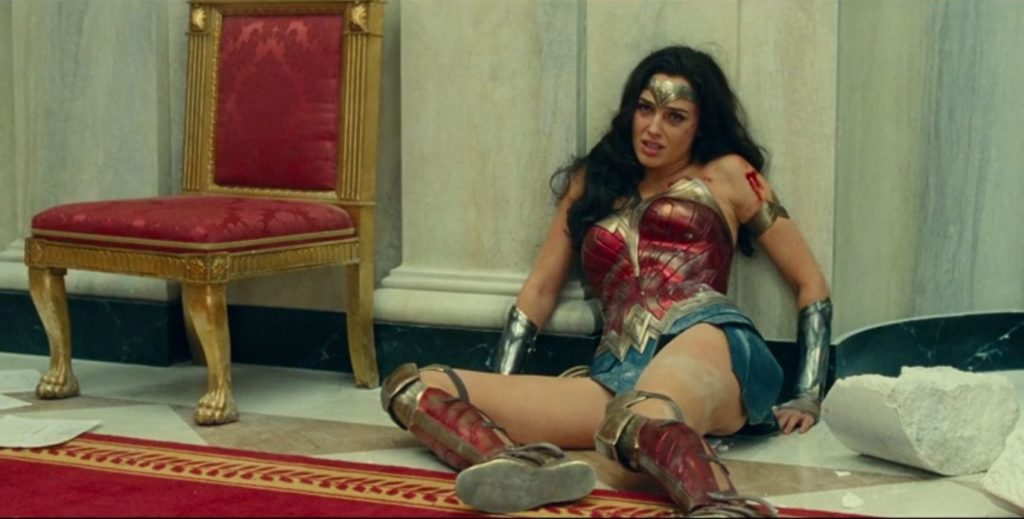
Secondly, Gal Gadot delivers a solid performance. At times, I feel like the personal charisma of the actress, alone, is the driving force behind the success of the Wonder Woman franchise. Gal shows a wide range of emotions and manages to balance vulnerability and compassion with confidence and certitude, which isn’t always an easy balance.
I also found Chris Pine’s performance to be a good compliment. He and Gal have decent chemistry and his supporting role is positively portrayed. After seeing the trailer, I really doubted the film would provide an adequate reason for his reappearance 40 years later, but the film does explain it and it works. He was good and his presence gave the sequel a sense of continuity. However, the writers decided to give Steve Trevor a different body and face, as if he took possession of another human being. Then, the movie just plows ahead and pretends he’s Chris Pine anyway. WHY? This was so needlessly confusing and caused so many questions.
I heard a lot about the main villain being a Donald Trump knockoff as well. While the movie does attempt to make the comparison, in my opinion, the comparisons were pretty light. If anything, the movie devotes more time to knocking former president, Ronald Reagan.
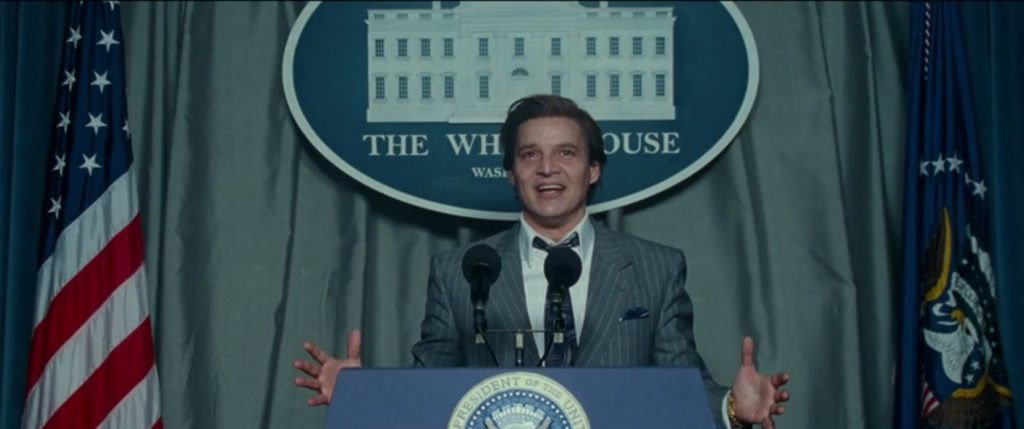
I thought Kristen Wiig showed some potential as a secondary villain. For most of the film’s opening, she carried the villain origin story with excellent presence and intrigue. Then she gets lost. She resurfaces near the end for a showdown battle, but the epic fight took place in the dark. I could barely follow the action. The look for the supervillain, Cheetah, didn’t quite work either. I couldn’t quite follow how a socially awkward corporate woman ended up looking like a character from the play, Cats.
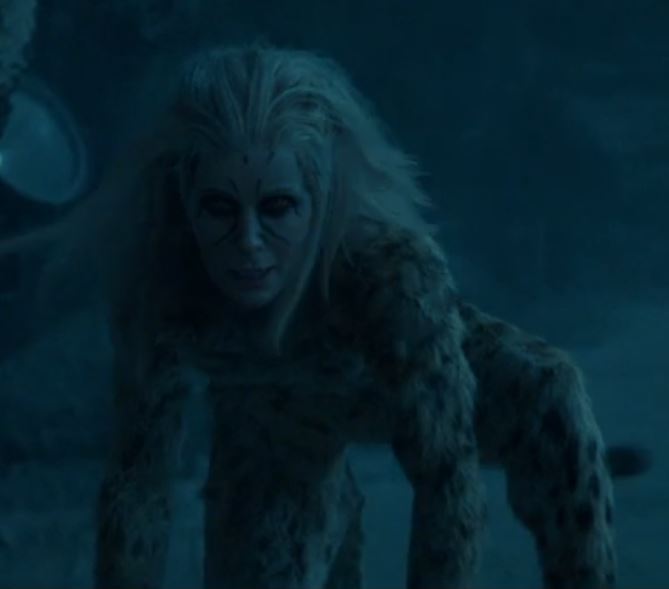
The problems with Wonder Woman 1984 are maddening because so many could have been fixed with better editing and adjustments to the script. Other problems arise in theme, pacing, and style. The golden armor, for example, is a good look, but totally mismatched to the situation. Wonder Woman doesn’t need the armor. It has no special powers. The golden armor is primarily symbolic of a woman’s stand against patriarchy, according to the backstory. But Wonder Woman dons that symbolic armor when she fights a female villain, so the symbolism is lost and devolves to a focus on style over substance.

There are scenes where she appears to be using her lasso to glide through the clouds. But then, at other times she appears to be able to control her physical body like Superman and shift directions. It’s actually never clear whether Wonder Woman can straight up fly.
And why the 1980’s? The setting seems to be hopelessly out of place and adds nothing to the dynamism and relevancy of Wonder Woman. When Steve Trevor tries to understand the 1980’s, I felt that the film trapped itself into a long montage of bringing him up to speed in comedic ways. Diana mostly follows a few paces behind Steve, grinning at his confusion. The movie goes over an hour without any serious Wonder Woman action. A plotline that tackles the nuclear arms build-up between the Soviet Union and the United States is outdated at best. Why not have a modern setting and tackle modern problems?
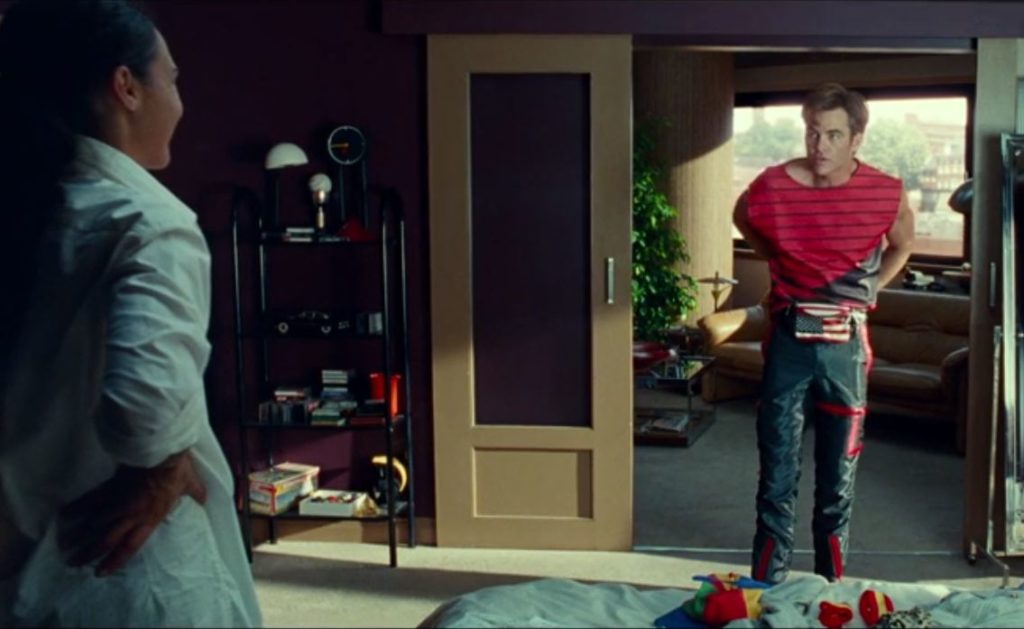
The invisible jet finally makes its appearance. The scene where Diana and Steve fly through a sky full of fireworks is one of the best sequences in the movie. But everything else is so dang clumsy. When Diana and Steve realize they must travel to Cairo, Egypt, they immediately decide to steal a museum jet rather than simply buy plane tickets. There’s absolutely no reason to break so many laws and resort to the theft of a military-grade vehicle. Diana remembers how to summon invisibility so off-handly that I wondered if the jet segment was added in post-production. The whole purpose behind the need for invisibility is specifically to avoid radar detection. However, the jet still physically passes through clouds, which means that radar waves can still locate them. Lastly, neither Diana’s ability to summon invisibility nor the invisible jet were ever mentioned again in the film. These are just lazy mistakes that go away with better writing.
The story then shifts to Egypt in a ham-fisted manner. Although the setting seemed to be out of place, I did enjoy some of the action between Wonder Woman and the armored vehicles. The superheroine pursuit came across as very entertaining and both my young sons reacted excitedly when Diana performed some larger-than-life superheroine moves—always a good sign. I particularly liked the scene where Wonder Woman is pinned between two armored vehicles and she strains to leg press them apart.
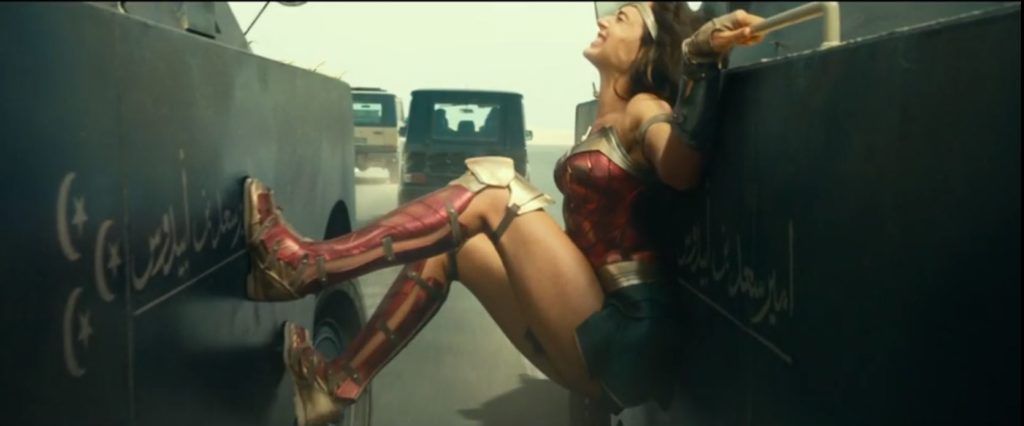
The film is also extremely loose on the nature of the villain and his actual abilities. He’s able to grant wishes. But sometimes, he seemed able to grant only one wish per person, and then at other times, he could grant multiple wishes. I never fully settled in with Maxwell Lord. He could trick people into making wishes by having them simply agree with a wish that he verbalized and then could simply name his price in return. It just seemed a little too easy. Twice, his son makes a wish to see his father more, which I thought would throw a monkey wrench into Maxwell Lord’s plans, but the film never follows up with the son’s wishes. And if the ending is meant to fulfill the son’s wishes, then did Maxwell Lord actually change through free will, or was it merely the effect of the wish?
Also, all the wishes in this film are negative. Not a single person wished for world peace or a cure for cancer. What happens when wishes are contradicted? When pressed to make a wish, why didn’t Diana wish for Maxwell Lord to lose his powers, or for the ancient artifact to be destroyed? This wish-fulfillment scenario was handled better in Bruce Almighty, where a comedy allows such an outrageous plot to both exist and yet be treated light-heartedly.
Despite all these criticisms, I still found some enjoyment watching Wonder Woman 1984. The character of Diana Prince as Wonder Woman is just plain likable. She comes across as genuine and serious as a superheroine. In many ways, I feel like good casting and solid acting compensate for the bad writing that mars the film. I can see many people watching and enjoying the movie, but the convoluted patchwork of a story won’t generate multiple viewings.
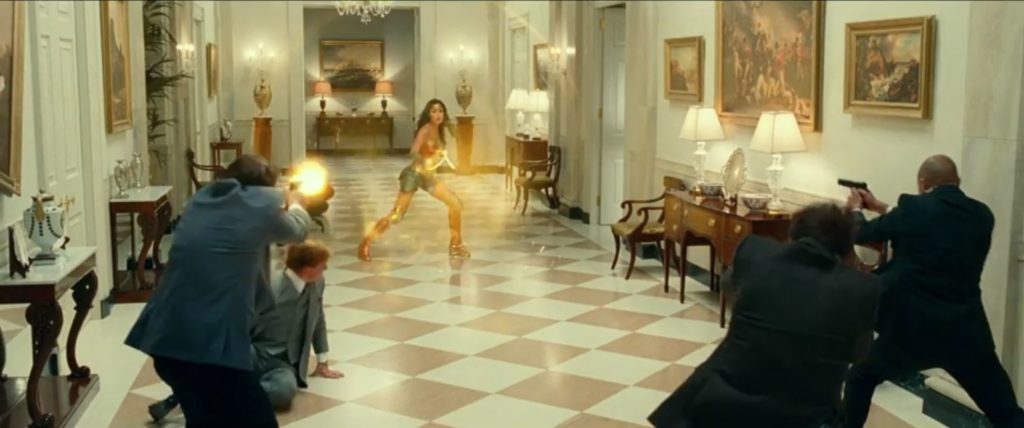
The first film featured mythological themes where Diana had to confront Ares, the god of war. So, facing off with a used car salesman and an insecure corporate woman seems like a major downgrade. I’d like to see some stronger themes for Wonder Woman. I’d like a deeper exploration of her struggles as a goddess among mortals. I want a more straight forward conflict. I’d like to see a stronger villain. And why doesn’t Wonder Woman get celebrity status or exciting press coverage in her world the way Superman, Batman, or Spiderman gets? That would add to her legend and mythology.
Ah well. We’ll get more Wonder Woman. And I think most of us will welcome her back for her third installment in the franchise. But the future of Wonder Woman is still grounded squarely in the success of the 2017 film.
Douglas A. Burton is an award-winning author whose current project centers on heroic women in fiction. For more, check out his website at douglasaburton.com
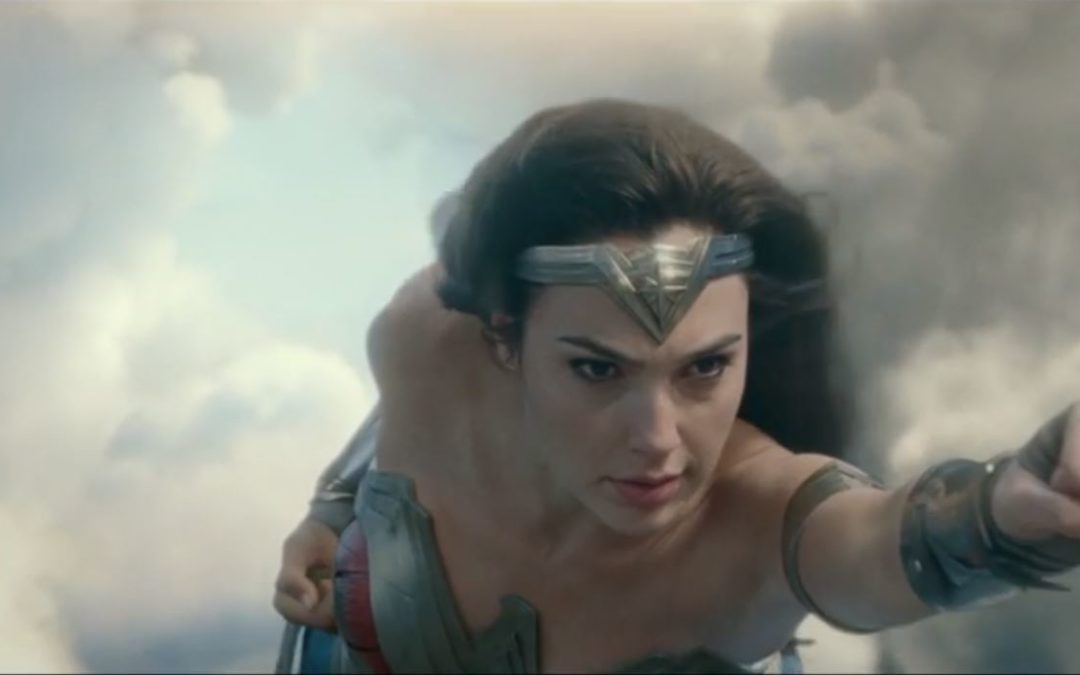
I think you’re bang on Gal Gadot makes this movie enjoyable despite the limiting tools she’s been given to work with, I also enjoyed the little surprise at the end.